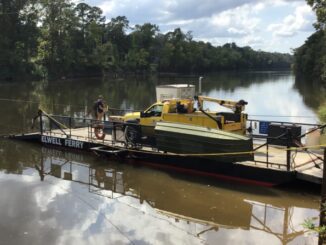
Every pay period, (based on a two-week pay period) we are suggesting items to pick up for your emergency kit in the event of a hurricane. By now you should have your water-tight tote.
As we go further into hurricane season, we will regularly remind you to purchase extra batteries for your Emergency Supply Kit.
So, here’s your checklist thus far:
A water-tight storage container with a lid
A first aid kit
A battery powered radio or a hand crank radio.
A whistle.
One to three gallons of water per day, per person (minimum)
Tools including pliers, scissors, Phillips and flat screwdrivers, boxcutter or sharp pocketknife, clawhammer and can containing small packages of fasteners.
Non-perishable food, both snacks and main meals.
This week, let’s focus on making a dark time a little brighter for your family.
Since the dawn of man, creating a source of artificial light has been a big part of our existence. From campfires and torches to candles and oil lamps, man has always sought a way to brighten up the night.
Lights are a very important part of your family’s emergency kit, along with the batteries to keep them running. In addition to helping you find your way through the house or the yard in the dark, lights have a positive emotional effect on both children and adults.
There’s a myriad of different lights for different purposes on the market today. LED bulbs help make lights brighter and stronger, but they can also use more battery power.
A good rule of thumb used by emergency managers is to have one fixed light, such as a battery-powered lantern, per room in your house. Even if you don’t use every room during a power outage, massing five or six battery lamps in one room can make things almost civilized in terms of brightness.
Another rule to follow is to have at least one flashlight of some kind for every member of your family – plus one extra. Ensure you have multiple spare batteries, especially if you have children. One way to estimate your battery needs is to add the number of batteries needed for each light in your kit, then multiply that total by five to seven. You won’t likely use an entire set of batteries every day during a power outage, but that ensures you will always have strong spares on hand when they’re needed.
Be sure you buy spare batteries in the proper size for your lights, and keep them together with the lights that use them. A dark room in the middle of a Category Two hurricane is not the time to be hunting batteries in the junk drawer.
What type of lights you use depends on your family – LED headlamps are handy for reading, keeping your hands free while making repairs, cooking and doing small tasks. Handheld lights put out more light for a longer distance. Lanterns are designed for stationary use. Many folks like to standardize their lights, to take advantage of bulk discounts online or in retail stores.
Check each light before a storm hits, and have them close at hand if the power goes out.
Candles and kerosene lanterns, while rustic and time-proven, should not be used unless you are in the room while they are burning. Keep a home fire extinguisher close by in case there’s an accident (and if you plan to use non-electric lights in your emergency kit, purchase a small handheld extinguisher.)
Lights can help keep your spirits up, keep your family safe, and if need be, signal for help during a power outage. See what works best for your family, and make sure you get supplied before the next power outage.
Remember, planning ahead makes it easier to focus on the problems at hand when and if there is an emergency.
This list is updated every week. It’s based on a plan that was developed by Pender County Emergency Management to help people prepare for hurricanes, but it’s applicable for any emergency situation.
Some folks like to buy a few items every week, or every pay period. Set up a plan of your own, and use this as a checklist.
















